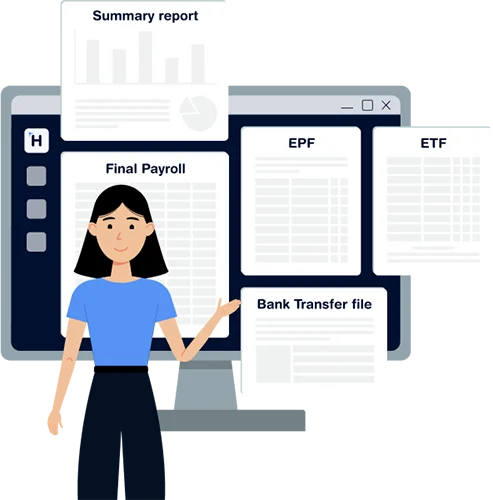Every small business recognizes the value of payroll, and most businesses outsource their payroll. However, these small businesses need to understand the importance of connecting leave management to their payroll. Thus, this article will explore this subject matter in detail to provide a comprehensive understanding.
How is payroll connected to leave?
Just like payroll software keeps track of the employee’s working hours and overtime hours, it keeps track of their leave. Many payroll outsourcing companies allow small businesses to have an employee self-service app where employees can view their time in and time out and apply for their leaves simply through their mobile phones.
What is leave management?
Employee leave management, also known as time-off management, includes the procedures and policies for handling an employee’s leave requests. Leave management aims to manage leave requests from employees fairly and correctly to ensure that the business is operated productively while employees receive the benefits of enjoying the leaves that they’re entitled to.
According to a 2017 Wellness in the Workplace survey, New Zealand companies lost over 1.51 billion USD due to 6.6 million days of unexplained absences from employees. Therefore, having an effective leave management system is essential to track down employee attendance and identify the type of leaves, grant leaves to employees if necessary and ensure that the productivity of small businesses is upheld while employees are on leave for the right reasons.
What are the different kinds of leaves found in the small business context?
According to an Indian payroll management software provider called SaralPayPack, there are two types of leaves which are accurate in the Sri Lankan context:
- Mandatory leave
- Leave
Mandatory leave
Mandatory leave is a paid leave for all employees where no deductions are made from their salary. Mandatory leave usually includes holidays such as:
- National holidays such as Independence Day and poya days.
- Weekly holidays – this depends on the business policy where most businesses give holidays at the end of the week. Still, some businesses such as salons, bakeries, supermarkets, bookstores, etc don’t provide weekly holidays to their employees.
- Religious festivals such as Thai Pongal, Deepavali, Vesak, Ramazan, Christmas etc.
Leaves
- Privilege leaves/earned leaves – leaves earned in the previous year and can be enjoyed by the employee in subsequent years. However, the employee needs prior approval from the HR team before the leave is accepted.
- Casual leave – these are leaves applied by employees for ordinary purposes. However, an employee is entitled to a limited amount of casual leave only based on company policy in all businesses. The employee needs prior approval from the HR team before the leave is accepted.
- Sick leave – Sick leaves are taken when the employee is ill and cannot show up for work. Based on specific company policies, an employee can take sick leave for a certain number of days. Businesses may require a medical certificate from the employee’s doctor as a part of the company policy.
- Maternity leave – a type of leave available for female employees in their last stage of pregnancy or getting closer to their final stage of pregnancy. In Sri Lanka, maternity leave is 12 weeks, excluding weekly holidays, poya days and statutory holidays.
- Half-day leave – an employee can request a half-day leave, but half of the employee’s salary will be deducted as half-pay, depending on the company’s policy.
- Study leave – An employee can request a study leave for a certain number of days when they have a university examination or assignment to provide more priority on.
- No-pay leave – this is where an employee has used up all his available leaves and needs to take a leave. The business can grant a no-pay leave if the employee gives a valid reason for taking the extra leave.
Why should the leave management process be integrated into your small business payroll?
According to a study by Aptitude Research Partners, 44% of companies in New Zealand use an integrated payroll and leave management system, and 44% of companies are less likely to have a high payroll error rate.
Therefore, leave management plays a pivotal role in being integrated into the payroll of a small business. The two functions are naturally connected and use the same employee information, sharing the same database. The employee’s information needs to be entered once, making it quick and convenient to update and manage employee attendance, leave, pay, and tax records.
What are the benefits of integrating the leave management process into your small business payroll?
- Reduces the chances of errors from wrongly entered data.
- Reduced admin and labour and thereby saving the business money.
- HR and managers will get a more accurate record of absences, leave patterns, and how much labour and leave are harming the business. As a result, proper work schedules, labour budgeting and appropriate decisions can be made to ensure business efficiency and productivity.
- Provides employees with a better understanding of their leave, pay and benefits. As a result, it clears doubts, improves trust and saves time for the employee, HR and management from resolving doubts on leaves.
Therefore, small businesses must get a leave management system with the payroll software to provide accurate and sufficient results of employee attendance and leaves while ensuring the productivity of the small business is upheld.
Are there different leave management system options for small businesses in Sri Lanka?
Based on our research, we have discovered that small businesses in Sri Lanka have a variety of leave management systems to select from depending on the number of employees and the business’s preferences on the payroll. You can now compare and choose the most appropriate leave management system to suit your payroll by clicking https://www.gethumanised.com/payroll/the-definitive-time-and-attendance-software-guide-for-sri-lankan-small-businesses/.
What are the small business payroll advantages of using leave management software?
By adopting a leave management software into the business process, the following advantages will be provided to small businesses:
- Eliminating manual and paper-based process – leave management software computerizes the main functions of employee absence management and provides greater productivity than spreadsheets. Managers, employees, and the HR manager can access a common portal for all the time and attendance data because time-off requests and reporting will be saved in the cloud.
- Real-time leave monitoring – Real-time leave monitoring in a leave management software provides complete access to every employee’s leave data, increments, leave balances, salary advance, etc. The real-time leave monitoring also enables HR to view who is almost done with their leave limit and who has not used their leaves. In this manner, the transparency of identifying who has time off and who doesn’t enable small businesses to plan the shift schedule and temporary staff replacements accordingly productively and efficiently.
- Compliance with labour laws – Based on labour laws and other relevant laws concerning leaves, leave management software is designed to comply with the regulations of such laws.
- Notifications for better leave management – customized notifications allow employers and employees to identify when employees submit their leave requests, when leave requests are approved and when employees are almost done with their leave limits. The software can be configured to remind managers about an outstanding leave request.
- Better communication between employer and employee – Rather than employees running after their managers or HR to remind them to accept their leave requests, both parties can be at ease as leave management software ensures that the leave request is effectively communicated to the manager or HR.
- Associating leave requests with business policies – businesses can integrate their policy requirements into the leave management software. Managers don’t have to stress approving requests that don’t comply with the business policies.
Therefore, we come to an end to this article, and we hope that you have gained a clear-cut understanding of leave management software and how beneficial it can be to your small business. Remember to select the most appropriate leave management software that suits your company policy and requirements!
Resources
https://www.lucidchart.com/blog/guide-to-employee-leave-management
https://salary.lk/labour-law/maternity-and-work
Types of leave in the Company | Leaves, non-leaves and holidays
https://www.tcpsoftware.com/blog/top-7-benefits-of-a-leave-management-system
https://www.myhr.works/nz/white-paper/payroll-and-leave-management

